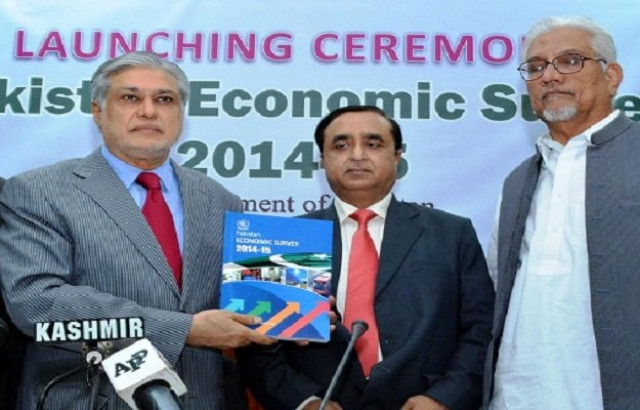The government’s report card
Govt has not done enough to encourage entrepreneurial creativity of the nation, which could kick-start economy

Finance Minister, Ishaq Dar at the launching ceremony of Economic Survey 2014-15. PHOTO: INP
What it is desperately trying to avoid taking responsibility for is the following fact: in a year that was an especially good one for the macroeconomic health of energy importing countries all around the world, Pakistan’s economic growth rate floundered, and it did so because the Nawaz Administration, despite having secured a significant electoral mandate in 2013, failed to initiate the necessary economic reforms needed to jumpstart the economy.
Let us start with the topline numbers. The provisional economic growth rate, subject to later revisions, for fiscal 2015 clocked in at 4.2 per cent, compared with the government’s target of 5.1 per cent and way below the seven per cent that most macroeconomists agree Pakistan needs in order to create broad-based prosperity and absorb all new entrants into the labour force. But let us break that number down even further. Agriculture grew by 2.9 per cent, industry by 3.6 per cent and services by nearly five per cent. Now, the government has talked in some detail about how political agitation by the PTI earlier in the year may have influenced the growth rate for industry and slowed down overall economic growth, apart from trying to explain away the slow agricultural growth too. What it all but completely ignored is the services sector, which happens to account for over half the economy. The services sector — the most ignored sector in the entire economy — is what dragged the rest of the economy across the finish line to a marginally respectable number, and yet about that, the government has very little to say, with little analysis of the performance here.
It is our contention that the government of Pakistan has a bad habit of intervening in several sectors of the economy and that when it does so, it tends to create opportunities mainly for rent-seeking and not nearly enough for genuine, sustainable economic growth. The sad fact, however, is that in every budget speech since at least the late 1990s, every finance minister that Pakistan has ever had agrees with us. Yet when it comes time to actually implementing the necessary reforms for the economy — privatising the energy sector and allowing more market-based pricing, for instance — they seem to dither on the altar of populist politics. This is why the services sector is the canary in the coalmine: the one sector the government has consistently ignored is the one sector that just happens to be the one that consistently outperforms the rest of the economy. Perhaps, it is time the government recognised that its role is not to try to engineer the economy to its own specifications but instead to act as a regulator that ensures a free and fair marketplace and then gets out of the way of ordinary Pakistanis finding the most valuable ways to serve one another.
Finance Minister Ishaq Dar, like all of his predecessors, got up on stage and gave a wide variety of excuses as to why the government was not able to hit its economic growth rate targets. The floods, the political agitation, etc. They are all true, but none of them give a true picture of what is really happening: the government of Pakistan has not done enough to encourage entrepreneurial creativity of the nation, which could kick-start the economy. It is time that it started doing exactly this.
Published in The Express Tribune, June 5th, 2015.
Like Opinion & Editorial on Facebook, follow @ETOpEd on Twitter to receive all updates on all our daily pieces.















COMMENTS
Comments are moderated and generally will be posted if they are on-topic and not abusive.
For more information, please see our Comments FAQ